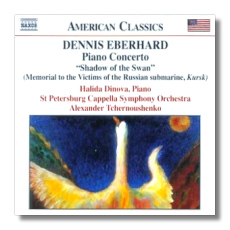
The Internet's Premier Classical Music Source
Related Links
- Latest Reviews
- More Reviews
-
By Composer
-
Collections
DVD & Blu-ray
Books
Concert Reviews
Articles/Interviews
Software
Audio
Search Amazon
Recommended Links
Site News
 CD Review
CD Review
Dennis Eberhard

- Piano Concerto "Shadow of the Swan"
- Prometheus Wept (August 6, August 9, 1945)
Halida Dinova, piano
Piotr Migunov, bass
St. Petersburg Cappella Symphony Orchestra/Alexander Tchernoushenko
Naxos 8.559176 DDD 56:07
Catastrophes provide the theme for this new release in Naxos' "American Classics" series. The piano concerto gets its subtitle from a short poem by Yevtushenko, in which he compares the explosion of the Challenger in 1986 to a "great white swan of death made from the last breath of seven evaporated souls." The direct inspiration for this concerto, however, was the sinking of the Russian submarine Kursk in the Barents Sea with all hands lost.
The 41-minute piano concerto is in three connected sections: "The Fall," "Requiem," and "Quickening." The first section reminds me of a Messiaen/Lutosławski hybrid – the music is at once tough and appropriately watery. Eberhard's scoring is very colorful, but his seriousness dominates any superficial prettiness, and this movement conveys both the beauty of the sea, and the terror that lurks beneath. Elegiac string writing plays an important role in the middle movement, but again, there are numerous references to the glittering but grim sound-world of the previous movement. At length, peace, even transcendence, are achieved. The final movement seems to be a sort of spiritual resurrection. It opens with and maintains a very John Adams-ish blend of Minimalism and Neo-Romanticism. In the first movement, melodic lines tended downwards; here, the opposite is true. Although it is possible to hear many influences in Eberhard's music, he is more than just an imitator, and "Shadow of the Swan" is a humane, musically viable, and forward-looking interpretation of a disturbing contemporary news item. Dinova plays her difficult part sensitively; Eberhard gives her few opportunities to show off in the traditional manner.
Prometheus Wept is an allusion, of course, to the Greek hero who championed mankind in defiance of Zeus, giving them the gift of fire. With the bombing of Nagasaki and Hiroshima in 1945, mankind showed it had the capacity to misuse Prometheus's gift – thus Prometheus's tears. This 14-minute work begins with a bass chanting (for more than four minutes) doom-filled verses from Revelations, substituting the name "Chernobyl" for the name of the star ("Wormwood") that falls from the sky. Again, Eberhard's use of glissandos, clusters, and hollow-sounding harmonies suggests composers as disparate as Shostakovich, Penderecki, and Ligeti, but the composer's sincerity is not in doubt. Even though neither of these works advances the frontiers of new music, Eberhard is a skilled composer who knows how to open a direct line of communication with the listener without insulting his intelligence, even if the message he wants to share is not necessarily a pleasant one.
The strings of the St. Petersburg Cappella Symphony Orchestra sound a little skimpy, but apart from that, these performances do the music justice. This ensemble, formed in the 1880s, was resurrected in 1991 after seven decades of oblivion. Tchernoushenko is its chief conductor. The engineering is very satisfactory.
Dennis Eberhard was born in 1943. Unfortunately, that's the only information Naxos provides about him. My curiosity has been piqued, and I hope we hear more from him soon… this time, with some biographical material included!
Copyright © 2004, Raymond Tuttle



















